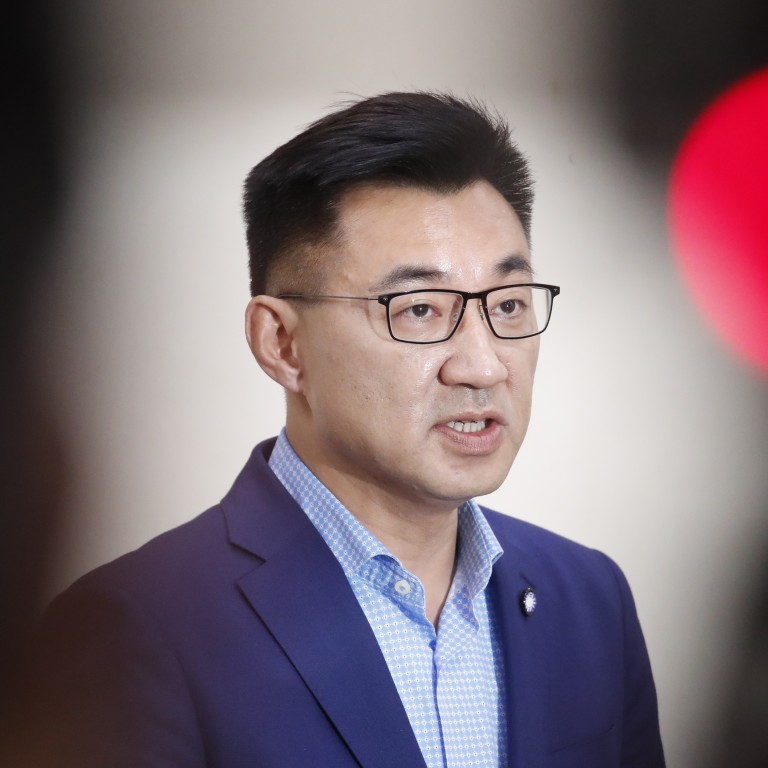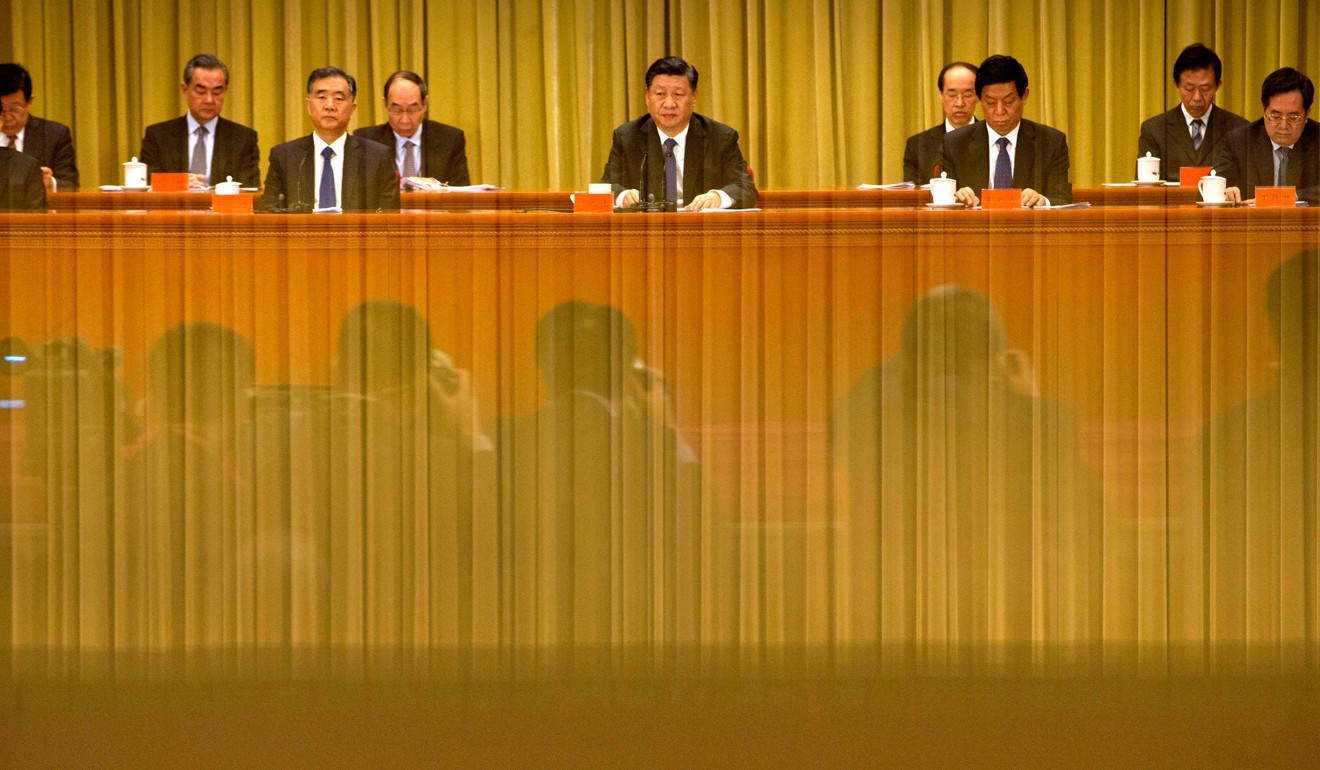
Can Johnny Chiang save Taiwan’s troubled Kuomintang party?
- He may have won the KMT’s leadership election, but the 48-year-old politician has only 14 months to resolve its financial and election woes
- If Chiang is to be anything more than a transitional leader he must win the public’s trust and re-establish strong ties with Beijing, observers say
The 48-year-old, US-educated politician defeated his sole opponent – former party vice-chairman and Taipei mayor Hau Lung-bin – in a poll that saw a record low voter turnout of less than 36 per cent.
And with anti-China sentiment on the rise in Taiwan, Chiang is also facing a dilemma over whether to ditch the decades-old political platform known as the 1992 consensus, which for almost 30 years has allowed the self-ruled island to maintain a functioning relationship with Beijing.
The Kuomintang was the dominant political party in Taiwan for decades, but since 2000 has competed for power with the Democratic Progressive Party (DPP). In January, the DPP’s Tsai Ing-wen was re-elected for a second term as president.
Taiwanese talk show host and political commentator Sissy Chen said the KMT was facing a mission impossible to return to power in the next two decades because of its failure to recruit fresh talent and win the support of younger voters.
It was “possible that the DPP will be able to remain as the government for at least 12, 15 and even 20 years”, she said in December, before Tsai’s election victory.
As Wu’s replacement, Chiang has just 14 months of a four-year term to prove he is the man to lead the KMT out of its slump. His goals were to bring young blood into the party and introduce reforms to win back public support, while at the same time securing Beijing’s trust, analysts said.
“If Chiang does abandon the 1992 consensus, it would be tantamount to removing its trust basis with the Chinese Communist Party and giving up its most valuable asset in dealing with the mainland,” former KMT legislator Chen Shei-saint said.
There was a need for the party to build a new consensus so that it could appease Taiwanese voters while not upsetting Beijing, he said.
Taiwanese to return from coronavirus centre after Beijing and Taipei reach deal
The consensus refers to an understanding reached between Taipei and Beijing in 1992 that both sides of the Taiwan Strait belong to “one China”.
Beijing, which considers Taiwan part of its sovereign territory, has insisted that the consensus is the sole political foundation for the two sides to remain interactive. The KMT claims that both sides agreed that each has their own interpretation of one China and for the KMT it stands for the Republic of China, the island’s official title.

In his inaugural speech on Monday, Chiang said he would give priority to party reforms and winning back public support, while deciding what to do about the 1992 consensus would come later.
“Without an internal agreement, we can do nothing, even if we can work out a new form for the 1992 consensus,” he said.
While it is a long-held tradition for the leader of the Chinese Communist Party to send a congratulatory telegram to newly appointed leaders of the KMT, Chiang has yet to receive word from Xi Jinping, which some political observers said could be seen as a snub.
On March 7, Zhu Fenglian, deputy director of the Taiwan Affairs Office – the mainland agency that handles relations with Taiwan – urged Chiang to “cherish and protect the mutual trust with the CCP on the foundation of the 1992 consensus” and “promote the peaceful development of cross-strait relations, and advance the interests and well-being of the people on both sides of the Taiwan Strait”.
Ni Yongjie, deputy director of the Shanghai Institute for Taiwan Studies, said that regardless of whether the terms of the 1992 consensus were amended, communication between Beijing and Taipei should remain open.
“What matters most is that the relationship between the two sides of the Taiwan Strait remains a domestic one, and not like one between two countries,” he said.
Chang Yu-shao, a researcher at the Cross-Strait Policy Association, a think tank in Taipei, said it was not surprising that Xi had not congratulated Chiang given the new KMT leader ‘s comments before the election.
“Beijing is taking a wait-and-see approach towards Chiang as what he said about the 1992 consensus amounted to him failing to complete his test paper,” he said.
US sends surveillance planes over Taiwan Strait after war games
Meanwhile, Huang Tzu-che, deputy director of the KMT’s cultural and information department, said the loss of support from young people and neutral voters was one of the major reasons for the KMT’s defeat in the January elections.
Chiang must respond to the “public’s expectations [and] current trends” to win back their support, he said.
Chiang campaigned for the KMT leadership on promises to rejuvenate the party. In doing so, he won the support of younger members and key party factions and saw off the challenge of the more experienced and influential 68-year-old Hau, winning by about 46,000 votes.
“The election result reflects that most party members think a generational change is needed to help the party regain power,” said former KMT legislator Sun Ta-chien.
“To do this, the party must understand the views of young people on important issues, use the language of young people, establish a platform for communication with them and propose policies that can win their trust.”
But Chen Shei-saint said Chiang was facing a challenging 14 months to prove he was the right choice for the KMT.
“To show he is not just a transitional chairman, Chiang not only has to prove that he is able to manage cross-strait issues but also initiate party reforms that can impress the public, while at the same time ensuring the KMT performs its checks and balances role within the legislature,” he said.
He must also win the support of the party’s old guard to back his reform measures, and raise enough funds to be able to maintain the party’s operations, Chen said.
Purchase the China AI Report 2020 brought to you by SCMP Research and enjoy a 20% discount (original price US$400). This 60-page all new intelligence report gives you first-hand insights and analysis into the latest industry developments and intelligence about China AI. Get exclusive access to our webinars for continuous learning, and interact with China AI executives in live Q&A. Offer valid until 31 March 2020.

